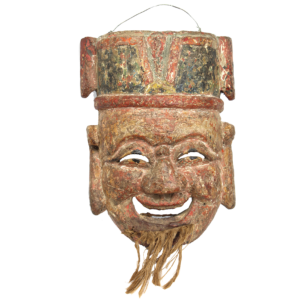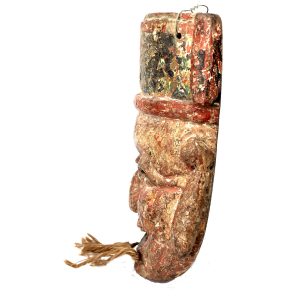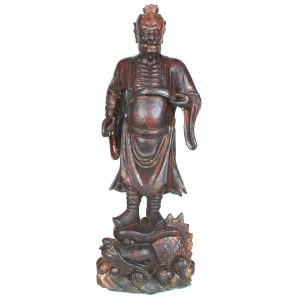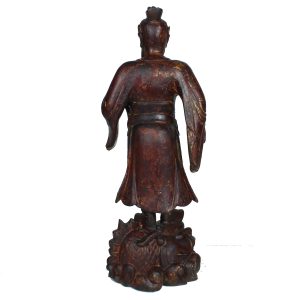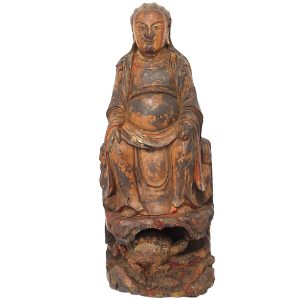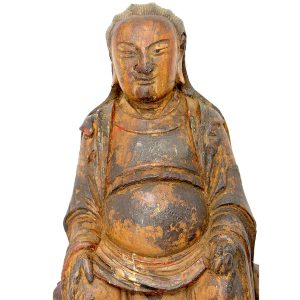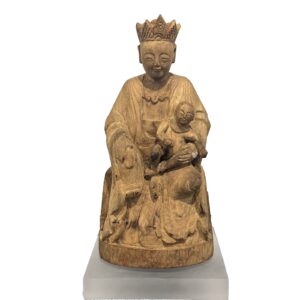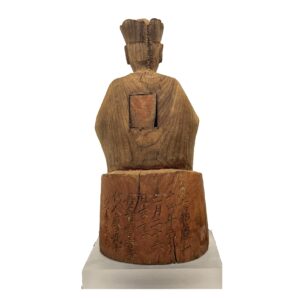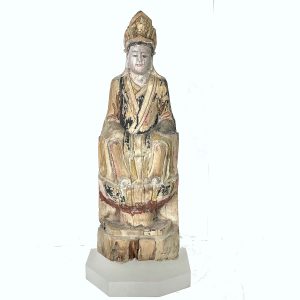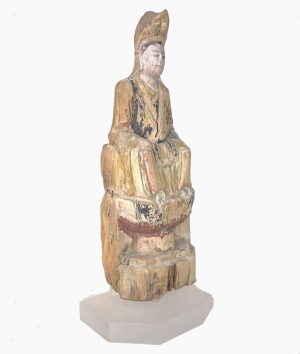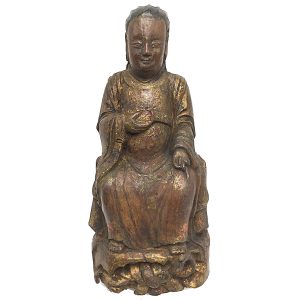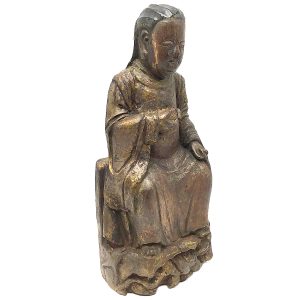-
Sale!


$595.00 Original price was: $595.00.$475.00Current price is: $475.00.
H: 10.5” W:7.75” D: 3” | FREE SHIPPING WITHIN CONTINENTAL US
This antique Nuo Opera mask is Tudi Gong, benevolent Earth god with smiling animated face, long eyebrows, hemp beard and high decorative hat. With an honest gentle disposition, he symbolizing the power of good to defeat evil. Nuo popular in Ming/ Qing dynasties, there are few remaining troupes.
-
Sale!


$1,095.00 Original price was: $1,095.00.$795.00Current price is: $795.00.
H: 15.5″ W: 5.5″ D: 4.5″| CALL 213-568-3030 OR EMAIL [email protected] FOR SHIPPING.
God of Literature, Books and Writing, Education, Learning and Examinations, Wen Chang is the patron saint of scholars. Thin, surly, demon like with exposed ribs and facial distortions, he stands on a dragon’ head among waves. Unique wonderful carving that would look spectacular on a desk.
-
Sale!


$575.00 Original price was: $575.00.$495.00Current price is: $495.00.
H: 13″ W: 5″ D: 4.8″ | FREE SHIPPING WITHIN CONTINENTAL U.S.
Provincial carving of Zhenwu the Perfected Warrior, one of the most popular Taoist deities in the Ming/Qing dynasties, iconically shown standing on a snake and turtle, symbolizing those over whom he presides.
-
Sale!


$1,350.00 Original price was: $1,350.00.$1,100.00Current price is: $1,100.00.
H: 11” W: 5.75” D: 5.125” | FREE SHIPPING WITHIN CONTINENTAL U.S.
Very rare and fine 16th century home shrine image with compassionate countenance of Songzi Guanyin the “Bestower of Children.” With joyful half-closed eyes, she looks lovingly at the child whose arm is draped over hers.and leans slightly forward.Wearing a 5- lobed crown centered with a camellia flower a Chinese symbol of young sons and daughters. Inscription dates it to 1521-1567
-


$1,375.00
SOLD H: 23.25″ W: 9.25″ D: 6.25″
This Guanyin image was probably one of a pair of images along with the Taoist Queen Mother of the West (16206A-WACK) placed together on a community, local temple or home altar. Created by the same local artisan, they are provincial rather than imperial style having a humble, unadorned and simple rendering, seated on backless thrones, hands covered by a ritual cloth, uncharacteristic of Guanyin but common for Taoist goddesses. Both wear layered robes and a high pointed crown – the Queen Mother’s centered by a phoenix and Guanyin’s by a flower surrounded by symbolic aureole of radiating light. Both have soft blissful smiles with eyes cast slightly downwards to engage their devotees. Initially covered in bright polychrome colors, there are traces of surviving red, yellow, green, brown and black.
-


$1,375.00
SOLD | H: 23.25″ W: 9.25″ D: 6.5″
This Queen Mother of the West, the highest ranking female Taoist deity was probably displayed as a pair along a statue of Guanyin, the most significant Buddhism female (Guanyin on a Lotus Pedestal (16206B) highlighting the importance and similarity of these revered female images Like the Guanyin, the Queen Mother’s delicately carved face has half closed eyes, serene composure mouth with a hint of a smile, which is more Buddhist than Taoist. Her headdress, centered by her iconic phoenix, rests under a hood extending to her shoulders and back. She wears a high collared three-layered Taoist robe, her hands covered by a ritual cloth.
-
Sale!


$595.00 Original price was: $595.00.$395.00Current price is: $395.00.
H: 12″ W:5.6 ” D:4″ | FREE SHIPPING WITHIN CONTINENTAL U.S.!
Zhenwu, the True Warrior, Perfected Warrior or Northern Emperor was one of the most popular TaoistDeities in the Ming and Qing dynasties known as protector of the state and the imperial family. His feet here rest on a pedestal over a turtle with a lifted head and a snake curled around his shell. Among the many interpretations this represent beings over whom he presided including both celestial officers under his command, [and] former demons that were conquered by him. This is a fascinating carving symbolizes trusted strength. and power.
End of content
End of content

